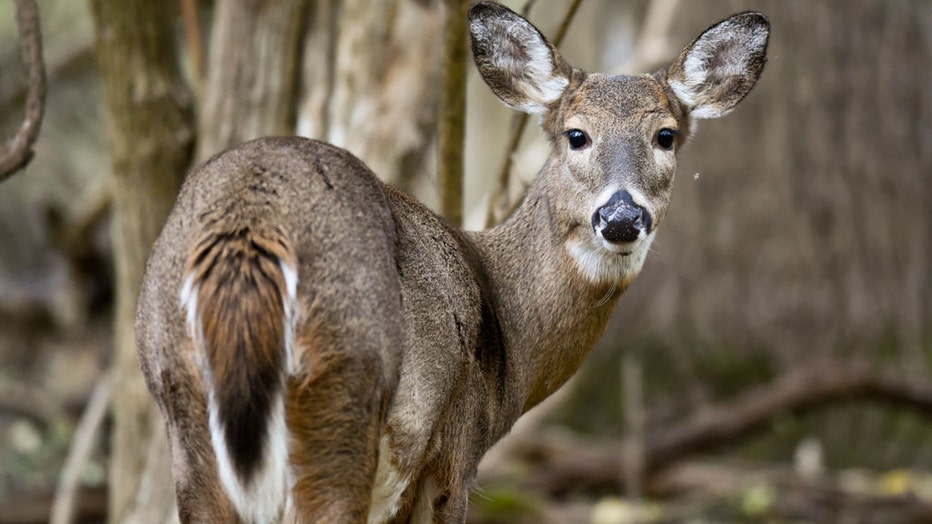Antibodies detected in white-tailed deer exposed to COVID-19 in 4 states, study says
A recent study conducted by the U.S. Department of Agriculture’s Animal and Plant Health Inspection Service (APHIS) found evidence of COVID-19 exposure in white-tailed deer in four different states.
Of the 385 samples that were collected, 40% came back positive for COVID-19 antibodies, according to the study.
"Antibodies are the result of an immune response to infection with a pathogen, and their presence does not necessarily suggest a current infection. The tests used to analyze the deer serum samples in this study can only detect antibodies, not the virus itself," the USDA specified.
Samples were taken between Jan. 2020 and March 2021 from animals found in Illinois, Michigan, New York, and Pennsylvania, according to the USDA.

FILE - A whitetail deer looks for food in the woods.
RELATED: Two-thirds of Michigan deer had COVID-19 antibodies in federal study
The study also noted that it is not known how the deer were exposed to COVID-19 and that human-to-deer transmission and vice versa were not unlikely, but the chances were low, according to the USDA.
"It’s possible they were exposed through people, the environment, other deer, or another animal species," the USDA said.
"There is no evidence that animals, including deer, are playing a significant role in the spread of SARS-CoV-2 to people," the USDA added.
Researchers also noted that there is no evidence that deer potentially infected with COVID-19 can pass on the virus to any animals or humans that consume its meat.
RELATED: ZooTampa may begin vaccinating animals against COVID-19 this summer or fall
Further study is needed to understand "how zoonotic pathogen spillback into novel wildlife reservoirs may affect pathogen adaptation, evolution, and transmission" of deadly viruses such as COVID-19, researchers said.
"Future wildlife surveillance should incorporate methods specifically designed to detect, isolate, and genetically characterize SARS-CoV-2 and to identify potential variants, as well as other endemic coronaviruses," the study concluded.
In a separate previous study conducted in Aug. 2020, scientists found that white-tailed deer were among a number of animals at high risk for contacting COVID-19.
"We identified a large number of mammals that can potentially be infected by SARS-CoV-2 via their ACE2 proteins. This can assist the identification of intermediate hosts for SARS-CoV-2 and hence reduce the opportunity for a future outbreak of COVID-19," the researchers stated in the study.
RELATED: COVID vaccine for zoo animals in Wisconsin
The team from the University of California, Davis analyzed and predicted the ability of the novel coronavirus to bind to the animals’ ACE2 receptors in the 410 vertebrate species including 252 mammals, 72 birds, 65 fish, four amphibians and 17 reptiles, according to the study.
"Only mammals fell into the medium to very high categories and only catarrhine primates into the very high category, suggesting that they are at high risk for SARS-CoV-2 infection," the study authors said in the published report. Catarrhine primates typically include orangutans, gorillas and chimpanzees.
Some of the animals found to be in the high-risk group included reindeer, white-tailed deer, Pacific white dolphins, beluga whales, chimpanzees, Western lowland gorillas and Rhesus macaques.
Cats, goats, sheep and cattle, meanwhile, were found to be the medium-risk group that included 57 species, while dogs, horses and pigs were among the 40 species considered to be in the low-risk category, according to the study.
FOX News contributed to this report.

